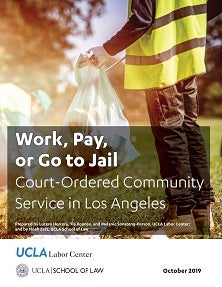Zatz Co-Authors Landmark Report on Court-Ordered Community Service

UCLA School of Law Professor Noah Zatz and scholars at the UCLA Labor Center have published a groundbreaking report on Los Angeles County’s broken system of court-ordered community service.
The publication, “Work, Pay, or Go to Jail: Court-Ordered Community Service in Los Angeles,” is part of a broad effort to combine research, teaching and public service in studying and addressing inequities in the region’s complex labor environment, and it is the first study to analyze a large-scale system of court-ordered community service in the contemporary United States. It details an elaborate enterprise that fails to achieve the goals of criminal justice reform, compels people into forced and unpaid labor, takes jobs from the mainstream paid workforce, and burdens people who live in marginalized communities.
A leading expert in employment and labor law, welfare, antipoverty policy and critical race theory, Zatz wrote the report with Lucero Herrera and UCLA Law alumna Tia Koonse ’11 of the UCLA Labor Center, and Melanie Sonsteng-Person, a doctoral student in social welfare at the UCLA Luskin School of Public Affairs. The study received substantial grant support from Arnold Ventures. It has been the subject of considerable attention since its October release, most notably in a front-page feature in The Guardian.
In studying the records of roughly 5,000 people whom the Los Angeles County Superior Court ordered to perform community service, combing through court records for about 600 cases, reviewing thousands of pages of court documentation overall and conducting 39 interviews, Zatz and his co-authors determined that community service — whereby criminal defendants perform jobs in lieu of paying fines or being incarcerated — is “a euphemism for a fundamentally coercive system situated at the intersection of mass incarceration and economic inequality, with the most profound effects on communities of color.”
Key findings include:
- Substantial barriers prevent many people — 66% in criminal court and 38% in traffic court — from completing court-ordered community service work by the initial deadline despite real and persistent fears of going to jail for failing to do so. For example, in criminal cases, 19% of the people studied faced a potential probation violation and revocation or bench warrant.
- Each year, about 100,000 unpaid community service workers labor alongside paid employees who perform identical tasks, but the community service workers do not have the same employment protections, including against workplace hazards, nor access to benefits such as Social Security.
- Despite assumptions that low-level offenses bring about comparably minimal terms of community service, people in fact regularly perform weeks or months of unpaid work.
- Government and private organizations rely so heavily on community service labor that they avoid hiring thousands of paid employees.
- Among people who were sentenced to perform community service, 78% could not afford to hire a lawyer and 16% were not proficient in English; in traffic court, 89% were people of color.
To improve the situation, the authors recommend that courts minimize threats of jail time when sentencing people to community service, that alternative sentences not include forced labor, and that mandatory community service be transformed into meaningful economic opportunity through paid jobs.
 The study is part of Zatz’s broader research project “Get to Work or Go to Jail,” studying systems that impose work requirements and enforce them with threats of incarceration. The project has been supported by fellowships that Zatz received from the John Randolph Haynes and Dora Haynes Foundation and from the Open Society Foundations. It has led to a number of academic publications and informed the efforts of public interest practitioners on the ground
The study is part of Zatz’s broader research project “Get to Work or Go to Jail,” studying systems that impose work requirements and enforce them with threats of incarceration. The project has been supported by fellowships that Zatz received from the John Randolph Haynes and Dora Haynes Foundation and from the Open Society Foundations. It has led to a number of academic publications and informed the efforts of public interest practitioners on the ground
“Conducting this study and generating this report was a real team effort that brought together people from across the UCLA and UCLA Law community to expose and address a festering problem at the intersection of the criminal legal system and economic and racial inequality,” Zatz says. “We hope it will help people committed to labor rights to see criminal justice as a labor issue, and people working to roll back racialized mass incarceration to craft reforms with their labor implications in mind.”
Many members of the UCLA Law community offered substantial contributions to the report, including alumni CT Turney-Lewis ’11 of A New Way of Life Reentry Project and Theresa Zhen ’14 of the employment and civil rights law firm Hadsell Stormer Renick & Dai; student research assistants Jessica Adlouni ’19, Sarah Austin ’19, Christy England ’19, Mary Lipscomb ’20, Han Lu ’16, Veryl Pow ’17, Seth Williams ’17 and Xuchen Zhang ’21; Benjamin Nyblade and Henry Kim of UCLA Law’s Empirical Research Group; several UCLA Law staff members; and students and staff in other departments at UCLA.